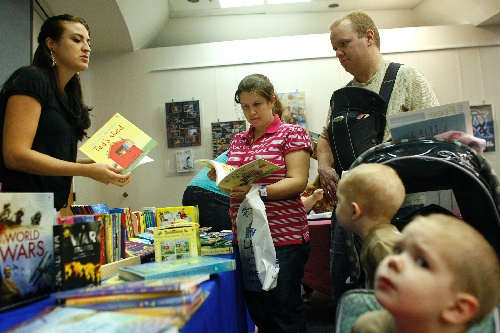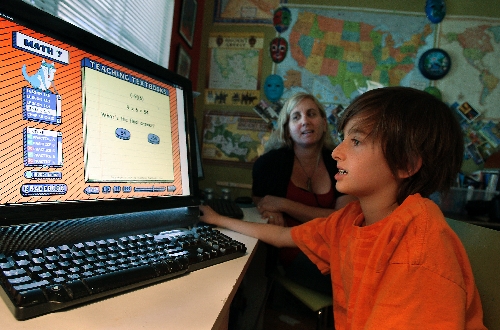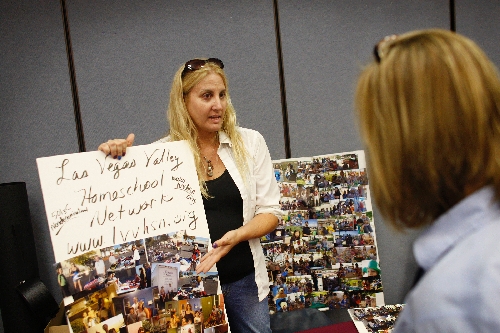Networking, resources make it easier for parents to teach their own children
On Aug. 30, when valley parents are fighting reluctant kids and heavy traffic to be on time for the first day of school, Kristina Krist and her four sons will still be enjoying a leisurely breakfast.
Afterward, she will clear the table while the boys take a seat somewhere in the house for their first lesson of the day. That might be at the computer, where Blake, 8, has been working on his math. Or on the sofa for a reading or history lesson. Adam, 11, might practice his piano.
Whatever they do, Krist knows there will be very little stress involved. That went away more than six years ago, when she and her husband took their boys out of the public school system and started home-schooling them.
Once an option parents undertook primarily to ensure their children's education fit the family's religious beliefs, home schooling has become more mainstream in recent years, appealing to parents for a variety of secular reasons, too.
Locally, there hasn't been a noticeable increase in the number of home-schooled kids, says Edward Goldman, the Clark County School District's associate superintendent of the education services division. But there is a growing awareness of home schooling as an option for children with health issues, behavioral problems and other nonreligious issues, Goldman says.
It's impossible to say just how many children are currently home-schooled in Clark County, Goldman says, because parents are required to inform the school district of their intentions only once. They file a form stating that they will home-school their child and provide an educational plan, which satisfies the state law governing home schooling, Goldman says. The school district cannot ask for progress reports or otherwise oversee the process. The home-schooling form is valid for 15 years, and parents do not have to inform the district if they decide to send their child back into the system.
During the 2009-2010 school year, 1,181 kids were removed from public school by their parents who intended to teach them at home. That was up from the previous year, when 1,002 forms were filed with the school district. In 2007, 2,866 forms were filed.
Nationwide, 1.5 million children were home-schooled in 2007, according to the most recent statistics from the U.S. Department of Education. About 36 percent of them were being home-schooled for religious reasons and 64 percent for secular reasons, such as a child's health problems, dissatisfaction with the public school system and concern about negative peer pressure. In 2003, 30 percent were home-schooled for religious or moral reasons while secular reasons accounted for 70 percent.
Krist, a former schoolteacher from San Diego, started home-schooling to meet her two oldest sons' special needs. Adam, the oldest, was more advanced than his kindergarten peers and Krist feared he would not be challenged academically, even if he skipped a grade. Kyle, 10, has autism. She says it made sense to home-school the youngest boys, 8 and 5, since she was already teaching the two oldest.
"There are a lot more people who go into it who aren't religious," Krist says of home schooling. "They want a better education for their kids, and they're dedicated to it."
Many home-schoolers use a packaged curriculum purchased through a company specializing in home schooling. Krist relies on her educational background to gather appropriate materials and plan lessons. Her children work a few hours a day on math, history, English and science, with some daily time devoted to extracurricular activities.
Krist collaborates with other home-schoolers through the Las Vegas Valley Homeschooling Network, a group she helped start. Other home-schoolers can be a valuable resource, especially when it comes to children and their social development, Krist says. The network enables them to take children on field trips and attend other events that schoolchildren are exposed to.
Opponents of home schooling often cite socialization opportunities as a reason to send children to a brick-and-mortar school, says Tony Robinson, a mother of four kids, ages 13 to 18. She started home-schooling 11 years ago.
She also relied on a network of other home-schooling families to expose her kids to others. And when she thought she was the only local African-American mother home-schooling her children, she started a Yahoo group to find others.
Robinson says though her family is religious, their beliefs weren't a factor in her decision to home-school. Rather, she wanted to ensure that all of her children received the same quality of education. Teaching at home was becoming more acceptable overall when she first started with her oldest son, Robinson says. But it was still controversial within the black community.
"At that time, it was pretty much unheard of, especially in Las Vegas," Robinson says. "It was like we were traitors, in a sense."
Critics within the black community couldn't understand why Robinson wanted to teach her kids at home when so many had fought during the Civil Rights era for the right to send their kids to public school, she says. Those objections have faded over the years.
"It's a very viable option for most parents," Robinson says. "You are your child's first teacher. You teach them to eat, walk, talk. So why not home-school them, if you can?"
Robinson, who has tried a variety of home-schooling methods, decided to use a charter school this year; the kids still will be at home for most days of the week, but also will spend one day at a school campus. The teachers there will map out the kids' curriculum and assist Robinson if she needs guidance, she says. It's not technically home schooling, because the kids will attend virtual classrooms online in addition to the weekly on-site visit. But Robinson considers herself to be their primary instructor.
"Looking back, I honestly believe home schooling was the best decision we could have made for our family," Robinson says. "That's not to say there aren't quality educators in the district, but the system is not going to work well for everybody. There will be some failures. And we couldn't take the risk of it being our kids falling through the cracks."
Contact reporter Sonya Padgett at spadgett@ reviewjournal.com or 702-380-4564.
HELP FOR HOME-SCHOOLERS
Home-schoolers seeking a resource beyond the public library might want to check out the Teacher's Resource Center at the University of Phoenix.
Teachers and home-schoolers can access materials, make things for their home classrooms and take workshops on how to teach a variety of things, including math and reading. Workshops are free, while materials can be used for a nominal fee.
The for-profit university decided to open the resource center as a way to get more involved in the community, says Mark Keays, director of academic affairs for the University of Phoenix.
"They just need to register with us and get into the system so they can access materials," Keays says.
For more information on how to register or get into one of the university's free workshops, send an e-mail to
trcworkshops@phoenix.edu
or call the resource center at 352-2944.
By SONYA PADGETT



















